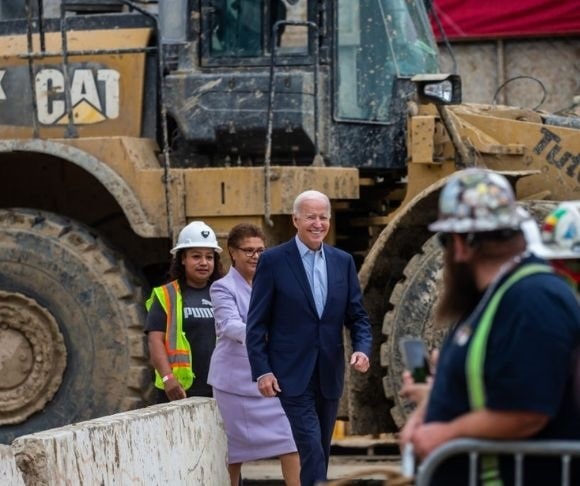For years, US manufacturing jobs have been a political football, with both sides claiming they represent the interests of places like Michigan, Ohio, and Pennsylvania. From former President George W. Bush to President Joe Biden, Republicans and Democrats have routinely failed this critical sector of the world’s largest economy, choosing to adhere to the doctrines of unions and protectionists. So, what is Biden claiming now about the manufacturing industry? It is all just lost in translation, unfortunately.
Biden Saves Manufacturing Jobs – But Does He, Really?
 Speaking at the SK Siltron CSS Facility in Bay City, MI, on Nov. 29, President Biden championed his economic record and how his policies have influenced the creation of manufacturing jobs. While much of the speech was celebrating policymakers from the Wolverine State, he made a couple of points about manufacturing that are worth repeating for those unable to watch.
Speaking at the SK Siltron CSS Facility in Bay City, MI, on Nov. 29, President Biden championed his economic record and how his policies have influenced the creation of manufacturing jobs. While much of the speech was celebrating policymakers from the Wolverine State, he made a couple of points about manufacturing that are worth repeating for those unable to watch.
The first assertion was that the Biden administration created 735,000 new manufacturing jobs “and we’re still counting.” (In his actual oration, he said his presidency produced just 700 jobs, but that is a separate gaffe for another day.) The second claim was that he is responsible for “sending good products overseas made by first-class labor.” The final and perhaps most egregious argument was that “federal investment attracts private-sector investments,” which could be the basis of the Keynesian economic doctrine.
President Biden uttered several other misleading comments, such as vaccinations rising from two million to 200 million (vaccines were starting to be rolled out when he arrived) and food price inflation slowing (it is not). But let’s grapple with the meat and potatoes of his manufacturing statements.
Jobs, Jobs, Jobs
At the time of the coronavirus pandemic, there were 12.785 million manufacturing jobs. As of Oct. 2022, according to data from the Bureau of Labor Statistics (BLS), there were 12.922 million positions. While plenty of employment opportunities have returned since the post-pandemic recovery, President Biden has perhaps only overseen 137,000 new manufacturing jobs. In addition, the latest ADP Research Institute labor report shows 100,000 lost manufacturing jobs in November. So, in total, Biden might be only responsible for 37,000 positions.
As Liberty Nation routinely noted throughout former President Donald Trump’s tenure, the rumors of manufacturing’s death have been greatly exaggerated. Despite the left and right espousing that this industry was on the verge of flatlining, US manufacturing has been robust. While payrolls might not replicate what they were at their peak in the 1970s, long-term productivity has remained strong. Washington has insisted since the beginning of the 21st century that America does not make anything anymore. Sure, the US does not manufacture T-shirts and snow globes anymore, but it does produce and export billions of dollars worth of chemical products, pharmaceuticals, motor vehicles, aerospace technology, machinery, and so much more.

Joe Biden (Photo by Apu Gomes/Getty Images)
Also, the president suggests that outsourcing has been the primary driver of lower manufacturing employment levels, but automation has played a far greater role. For example, a June 2021 working paper by top economists averred that machines were replacing workers more than outsourcing overseas.
From government spending creating economic growth to federal outlays garnering private investment, this Keynesian belief has been the basis of US policymaking for decades. Of course, as eminent economist Ludwig von Mises famously averred in Human Action, the state can only spend or invest what it confiscates from its citizens. Politicians spending capital in the private economy destroys wealth, wastes valuable resources, and distorts economic conditions. Lawmakers and regulators take from the free enterprise system and then establish a nudging ecosystem to fulfill the desires and aims of whatever leaders dream about in their sleep. So, does the manufacturing sector want to allocate its finite resources to electric vehicles? If this is what the marketplace signals, then perhaps it would. But it’s up to the private market, not the Leviathan.
Manufacturing Is Slowing Down
Unfortunately, US manufacturing growth is slowing to the lowest point in about two years amid broader recession fears. The S&P Global US Manufacturing Purchasing Managers’ Index (PMI) – an index of economic trends – slipped into contraction territory of 47.6 in November. The Institute of Supply Management’s (ISM) Manufacturing PMI further weakened in October. Both gauges were driven by slower employment growth, a decline in output and new orders, and lackluster business sentiment. In the end, America’s long-term manufacturing prospects are healthy due to the world’s transition away from China. For now, however, a recession could weigh on the sector.




